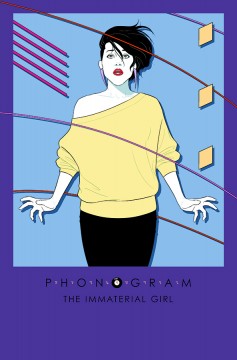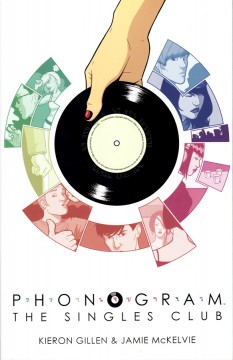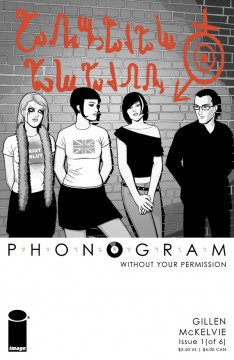“You will never look at A-Ha’s Take On Me in the same way again.” Kieron Gillen discusses Phonogram: Immaterial Girl
 Having completed their first 12 issues of their creator-owned series The Wicked and The Divine, writer Kieron Gillen and longtime collaborator Jamie McKelvie are returning to the equally esoteric world of their breakout hit in Phonogram: Immaterial Girl. Arriving this August from Image Comics we catch up with writer Kieron to talk about pop stars as gods, phonomancers and mind-bending versions of classic ’80s music videos
Having completed their first 12 issues of their creator-owned series The Wicked and The Divine, writer Kieron Gillen and longtime collaborator Jamie McKelvie are returning to the equally esoteric world of their breakout hit in Phonogram: Immaterial Girl. Arriving this August from Image Comics we catch up with writer Kieron to talk about pop stars as gods, phonomancers and mind-bending versions of classic ’80s music videos

The first two Phonograms have been very much ’90s and ’00s focused in terms of their musical tastes and pop culture references, yet Immaterial Girl seems to scream 1980s – from the title to the look and feel of the cover – is this a sign of a shift in perspective for you and Jamie, or a new direction for the characters?
KG: Phonogram’s always been interested in writing about periods. Hell, all the books have been explicitly period works. Rue Britannia was about the 10 year gap between 1994-1996 and 2004-2006. Singles Club was set very specifically in a single night in 2006, and works like this little Kandor-esque bottle kindom of an Indie Club. Immaterial Girl is about many things, but at least part of it is about Pop Videos – and specifically how they change music, and how they change how individuals relate to music. As such, the impact is always biggest when they first start to dominate culture – which is MTV ’80s, and appropriately the background to [Immaterial Girl’s lead character] Emily Aster’s own childhood.
So there is a lot of explicit homage and critique of those particular icons of the period… but it’s a book that dances across time. It’s primarily set in 2009. Its prologue is in 1984 or so. Its opening movement is in 2006. In the same way as Rue Britannia moved around the relevant bits of Kohl’s life, this moves across the important bits of Aster’s.
And, in a real way, you will never look at Take On Me in the same way again.
There was talk of you doing Phonogram before The Wicked and The Divine, so has working on that changed any of the long term plans you had or has it actually helped you to focus your mind and distil this new arc down to what it needs to be?
KG: Actually, there was talk of doing Phonogram 3 before Young Avengers, let alone WicDiv. We thought we would be able to do both, but the scheduling didn’t work, and we put it on the backburner. All six scripts were written back in 2012. I’m doing a pass on them now, and stressing or reducing elements, but that’s relatively minor stuff. I’m certainly not doing anything like cheating to make me appear to be more prescient about the way culture went in my 2009 sections. Or, at least, I’ve managed to resist it so far.
Any plans for character crossovers between the two series?
KG: Actually, there’s already been a soft crossover between the two books. It’s a sneaky one though.

Does returning to the Phonogram world allow you to explore more far-reaching topics and themes that you can’t cover in your more mainstream work?
KG: I’m not in a position to really make that call. Tell me what you think when you’ve read the thing. Phonogram as a whole remains the oddest and most experimental work which I actually expect a sizeable number of people to read. It’s this genre piece which is basically about to explode due to all the things we’ve crammed inside it.
But I’ve written a lot of comics since the last time we had Phonogram out. Jamie’s drawn a bunch too. We’re different people and do it in a different way. However, we wouldn’t be doing it if we didn’t think we were capable of doing Phonogram any more. It remains as odd as ever, if not more so.
I think the delay in its release is going to be interesting – as it was all written before Young Avengers means it’s kind of the missing link in our creative history. You’ll see themes which we’ve taken a different way in later works broached for the first time there. In a COMPLETE KIERON GILLEN AND JAMIE MCKELVIE AND MATT WILSON book, the stories would be laid out in a Phonogram: Rue Britannia, Phonogram: The Singles Club, Phonogram: The Immaterial Girl, Young Avengers V2, The Wicked + the Divine manner.
If Immaterial Girl is your ‘difficult 3rd album’ when it comes to Phonogram, did you find there was additional pressure to create something new and different for this latest incarnation in order avoid the trap of it being ‘just another Phonogram book’?
KG: We spend a lot of time thinking about Phonogram. It’s overthought from top to bottom, in its every element. It’s a work of obsession.
The one thing we’ve never worried about is the audience. They’re either with us or they’re not. We have enough to worry about with things we can control.
I’d be fine with being another Phonogram book. It’s Phonogram. For better or worse, there’s nothing else like Phonogram. Every time I get a Phonogram page back, I almost can’t believe it actually exists. It’s been a long road here, and I just want to hug everyone.

If you could choose one song to perfectly soundtrack Immaterial Girl what would it be and why?
KG: One song? It’s probably going to be TAKE ON ME, just because of its core part of the story, and influential in lots of ways. It’s a pop song whose video is about a comic book. We’re a comic book about a pop song whose video is a comic book. That sort of circular homage and metacritique is right at the heart of the book – it’s often about how image (video) and content (the music) interact, chase each other, corrupt one another, save one another, enhance and weaken and all that jazz. In comics terms, the words and pictures of it. To quote a great man, you can do anything with words and pictures.
Are you planning on doing soundtracks and playlists to accompany this series, as you’ve done on previous volumes?
KG: There is a playlist. I’m not sure if I’ll make it public. It’s an odd one, and very much made as a tool for me. I suspect people will be surprised at how small it is. The WicDIv playlists are kind of phonomantic tools. Rue Britannia’s playlist was every record I owned from 94 to 98, loaded up onto an MP3 player, and put on shuffle. I never skipped a song. It was about finding exactly how i felt about this stuff, unedited. The Single Club’s playlist was much more literal – as it was a comic set in a small time period, it was the songs in the comic, arranged chronologically. Immaterial Girl is as lost in time, and obsessed over odd things as the book is.
I mean, Phonogram is different. Every PG script includes a list of all the music I was listening to as I wrote it, broken up on what artists on what day. As I said, it’s obsessional, and that’s what people respond to in it. Even people who don’t like music – and you’d be surprised at the number of PG readers who aren’t music obsessives – seem to respond to that.
Phonogram is released by Image Comics on August 2015 and will be available from ComiXology and the Image Comics Digital Store.



December 20, 2025 @ 6:32 am
Ich werde Ihre Beschwerde nun an meinen Kollegen Peter weiterleiten ( [email protected] ),
die Ihnen gerne behilflich sein werden. Wir verwenden auf
unseren Seiten Affiliate-Links und erhalten möglicherweise eine Provision für Kunden, die an Online Casinos verwiesen werden. Teilen Sie Ihre Meinung mit oder erhalten Sie Antworten auf
Ihre Fragen. Sie war verwirrt und verärgert und bat um Unterstützung, um ihre Gewinne zurückzuerhalten.
Zwar gibt es keine E-Mail-Adresse oder Telefonsupport, jedoch bietet das Casino einen umfassenden FAQ-Bereich.
Ferner erhalte ich die Möglichkeit, echtes Geld zu
gewinnen und meine bevorzugten Spiele in vollem Umfang zu genießen. Mit einer lizenzierten und regulierten Plattform bietet es eine
vertrauenswürdige Umgebung für ein unterhaltsames und sicheres Spielerlebnis.
Das X7 Casino geht sogar noch weiter und stellt einen Selbsttest zur Verfügung,
mit dem ich mein eigenes Spielverhalten überprüfen konnte.
Diese Funktionen sind einfach in den Kontoeinstellungen verfügbar und bieten mir einen zusätzlichen Schutz, um das Spielverhalten in geordneten Bahnen zu halten.
Spieler haben die Möglichkeit, durch verschiedene Missionen Freispiele zu verdienen, was das Spielerlebnis zusätzlich
bereichert. Die großzügigen Willkommensboni und die Vielfalt an wiederkehrenden Aktionen werden ebenfalls positiv
bewertet. Ein häufig gelobter Punkt ist der 24/7 Live-Chat-Support, der den Spielern rund um die Uhr zur Verfügung steht und schnelle
Antworten bietet. Diese Bewertung zeigt, dass das Casino insgesamt eine solide Leistung bietet,
aber auch Raum für Verbesserungen hat. Das
x7 Casino hat bei Askgamblers grundsätzlich eine
positive Bewertung von 3.9 von 5 Sternen erhalten, basierend
auf 17 Stimmen. Schließlich werden auch die attraktiven Willkommensboni positiv erwähnt, die neuen Spielern einen guten Start ermöglichen und das Spielerlebnis zusätzlich bereichern .
References:
https://online-spielhallen.de/avantgarde-casino-aktionscode-ihr-weg-zu-exklusiven-vorteilen/
December 26, 2025 @ 7:07 pm
We appreciate that players will have different preferences
when it comes to communication – and besides, different
problems require different methods of contact. Level
up through our loyalty program, from Tourist to Absolute Legend, and enjoy
premium offers such as a personal host and monster daily bonuses.
Log in to your casino account and open the Cashier2.
You’ll find 500+ pokies, crash games, table titles, and regular tournaments paying out thousands in prize pools.
Players are advised to check all the terms and conditions before playing in any selected
casino. CasinoMentor is a third-party company in charge
of providing reliable information and reviews about online casinos and online casino games, as well as other segments of the
gambling industry. Remember to always gamble responsibly and adhere
to the terms and conditions of the bonuses to make the most of your gaming experience.
Whether you’re a seasoned player or a newcomer to online casinos,
finding information about promotions on Ozwin Casino is easy and convenient with Casinomentor’s assistance.
Once the code is confirmed, the promotion will be credited to their account, and they
can start enjoying the benefits immediately.
References:
https://blackcoin.co/casino-rocket-australia-your-next-favourite-online-spot/
December 27, 2025 @ 2:46 am
Having a mobile version won’t catch anybody off guard anymore.
Players have the chance to win big money and feel incredible feelings when they
hit the jackpot. Jackpot is a tried and true method that attracts customers, builds
their audience, and improves the casino’s image.
The platform collaborates with numerous top-tier
software providers, guaranteeing high-quality gaming experiences
across all genres. Logging into RocketPlay Casino is a
straightforward process that allows players to access their accounts quickly and securely.
Yes, players from some countries like the US and UK can’t sign up.
Still, for casual punters and seasoned players alike, it’s a strong pick.
The player from Quebec is filing a complaint against RocketPlay Casino
for restricting his account without explanation and withholding
approximately $11,000 in winnings. He is requesting a refund of his
original deposits under the casino’s Refund Policy (Section 10), has submitted all required KYC documents, and is willing to provide additional verification. The player from Australia acknowledges his RocketPlay account suspension for T&C violations and is not disputing
the suspension or any forfeited winnings.
References:
https://blackcoin.co/what-to-wear-for-the-casino-dress-code-and-whatll-get-you-kicked-out/
December 29, 2025 @ 5:52 am
online casinos that accept paypal
References:
karierainsports.gr
December 29, 2025 @ 6:14 am
paypal casino android
References:
jobsleed.com